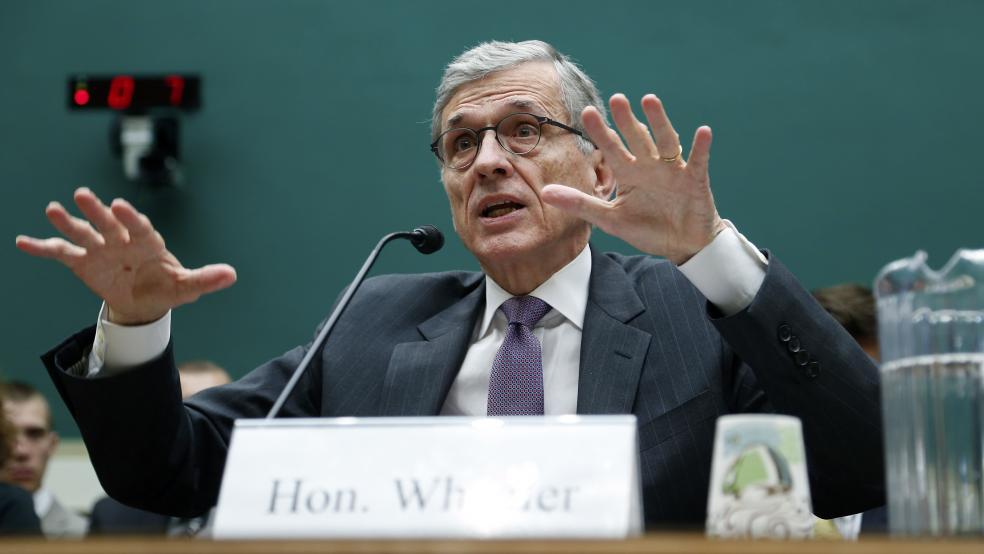Call it the rehabilitation of Tom Wheeler.
It wasn’t long ago that the Chair of the Federal Communications Commission, who happened to be the former top lobbyist for the association that represents most major Internet Service providers, was being cast by activists as the villain in the network neutrality debate – essentially the question of whether ISPs should have the right to prioritize the content that flows across their networks.
In the activists’ view, Wheeler was the man who was plotting to kill the open Internet by allowing ISPs to sell access to Internet “fast lanes” that would give priority to content providers who could pay for it, while leaving others – including personal websites, cash-strapped start-ups, and possibly the competitors of the ISPs’ subsidiaries – stuck in an Internet slow lane.
Related: John Oliver Just Won the Net Neutrality Battle
On Wednesday, though, Wheeler emerged as a full-throated champion of what appears to be unfettered network neutrality. That is to say, he is proposing a change in the rules that would create a system under which ISPs must grant equal access to their networks, whether the data is flowing from Netflix or the start-up in someone’s garage that wants to beat Netflix at its own game.
His proposal would reclassify broadband Internet service as a public utility, subjecting ISPs to regulation similar to the existing rules for telephone service.
Wheeler made the announcement in an op-ed published on the website of Wired Magazine.
The move, he wrote, will “preserve the Internet as an open platform for innovation and free expression. This proposal is rooted in long-standing regulatory principles, marketplace experience, and public input received over the last several months.”
He continued, “I am submitting to my colleagues the strongest open Internet protections ever proposed by the FCC. These enforceable, bright-line rules will ban paid prioritization, and the blocking and throttling of lawful content and services. I propose to fully apply—for the first time ever—those bright-line rules to mobile broadband. My proposal assures the rights of Internet users to go where they want, when they want, and the rights of innovators to introduce new products without asking anyone’s permission.”
The proposal is precisely the opposite of what Wheeler’s former employers, the cable and wireless industry, supported. In a statement released Wednesday, National Cable & Telecommunications Association CEO Michael Powell said the proposal “will result in a backward-looking new regulatory regime, ill-suited for the dynamic Internet, with far reaching and troubling consequences. We believe that such a significant expansion of the FCC’s authority is unnecessary and will only deliver further uncertainty instead of legally enforceable rules that everyone supports.”
In an ironic twist, Powell himself is a former FCC Chairman, who ran the agency when Wheeler was CEO of the NCTA.
Related: The Net Neutrality Debate Explained
Wheeler had been under enormous pressure, both from the public, which submitted some 4 million comments to his agency, and from the White House. President Obama, who appointed Wheeler to his job, came out last year in favor of reclassifying ISPs as public utilities.
At least some of the people who opposed Wheeler’s former positions were willing to give him credit for a principled change of heart.
“I think the fellow has been engaged in serious and intensive study,” said Former FCC Commissioner Michael Copps, now a special adviser to the Media and Democracy Reform Initiative at liberal advocacy organization Common Cause. “I think he would tell you that he was tending in a different direction several months ago. I think he dug into the question that with that fine brain of his and concluded that this was the way to go.”
With regard to the decision itself, Copps said, “It’s historic and I’m euphoric. This is a huge step forward for consumers…and for the Internet.”
Related: FCC Change Means Millions No Longer Have ‘Broadband’ Internet Access
Others saw the move as more of a retreat from public pressure.
“Unquestionably, this is a huge and unprecedented victory for Internet users and grassroots organizers,” said Evan Greer, campaign director for Fight for the Future, a nonprofit that helped organize many of the most high-profile efforts in favor of net neutrality.
“This is a complete about face on the part of the FCC,” she said. “The FCC had a proposal that would have broken the Internet, and the Internet rose up. Intense public pressure sent the FCC back to the drawing board.”
A notable element of Wheeler’s announcement was the inclusion of wireless broadband Internet service under the new proposal.
Related: Obama Could Face a Net Neutrality Fight with His Own FCC Chair
Former FCC Commissioner Copps said the move to include mobile broadband was a commonsense step, given the increasing number of people for whom mobile access is the primary route to Internet connectivity.
“There should be parity,” he said. “More people are hooked up to the internet on mobile than fixed broadband.”
He said years ago there was merit to the argument that mobile broadband should be left alone while the market developed. However, he said, “Now it’s found its footing, it’s developed, it’s not a nascent industry and people have a right to expect that it will behave in similar terms to the way [other services providers] behave.”
On net, Copps insisted, the change would be good for everyone. He pointed out that in the wake of Wheeler’s announcement Wednesday, the share price of major ISPs jumped.
“Business can’t operate with a question mark,” he said. “I think it’s good for business to get some certainty and get this dispute behind us. They’re still going to be able to make lots of money.”
Top Reads from The Fiscal Times





